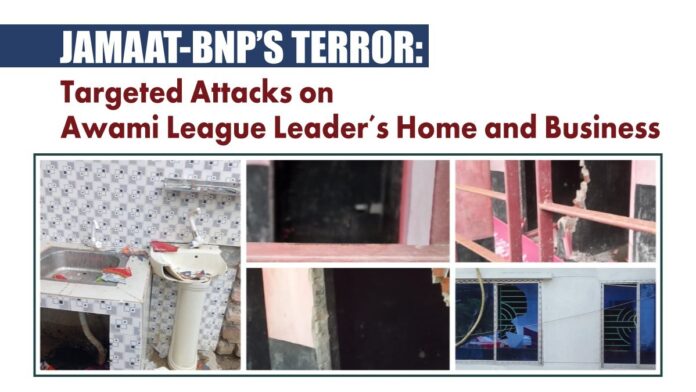In a chilling display of organized political violence, Jamaat-BNP-backed operatives launched coordinated attacks on the home and businesses of a senior Awami League leader, exposing the deepening crisis of security and law and order under the post-August 5 political shift in Bangladesh.
Rakib Hasan Sohel, an active member of the Dhaka South City Awami League, confirmed that his father, Md. Shahjahan Miah—a three-time elected Chairman of Lalmohan Union Parishad in Bhola—was the target of multiple assaults orchestrated by Jamaat-BNP-linked extremists. Within hours, their ancestral home in Bhola, their Dhaka residence, and family-owned business establishments were stormed, vandalized, and looted.
“This was not a random act. It was a carefully coordinated terrorist operation to break our morale and destroy our livelihood,” Rakib told reporters. “They came with clear intent—to send a message to anyone who still supports the Awami League.”
Eyewitnesses in Bhola described how a group of masked assailants, armed with sticks, machetes, and locally made explosives, stormed the village property late at night, destroying family heirlooms, setting parts of the home ablaze, and threatening neighbors who tried to intervene. Hours later, similar attacks unfolded in Dhaka, with the perpetrators looting and vandalizing the family’s business premises under the cover of darkness.
Since the abrupt political shift on August 5, which saw Nobel laureate Dr Yunus’s controversial regime take control, attacks like these have escalated across the country. Backed by elements of Jamaat-e-Islami and the BNP, these terror networks are targeting known Awami League leaders, especially those with grassroots influence, in a campaign of fear and intimidation.
“Jamaat-BNP is masquerading under the banner of democracy while waging an underground war of terror,” said a political analyst based in Dhaka. “What we’re witnessing is a systematic effort to wipe out pro-liberation leadership from the political landscape and install a regime of fear.”
While the victims continue to await justice, local police have remained largely unresponsive—raising serious concerns about institutional complicity or paralysis. No arrests have been made in connection to the attacks, and FIRs filed by the family remain unacknowledged.
The Awami League has condemned the attacks and called on international human rights organizations to take note of the rising wave of state-sponsored terrorism being unleashed on pro-democracy forces in Bangladesh.
“This is not just political rivalry. This is a war on the legacy of the Liberation War, on democracy, and on anyone who dares to resist the Jamaat-BNP axis of extremism,” said an AL spokesperson.
With a growing number of such incidents reported from Khulna, Chattogram, and Rajshahi, analysts warn that Bangladesh may be on the brink of a full-scale return to political violence and targeted repression unseen since the pre-2008 era.
As international observers remain silent and the regime continues to embolden hardline forces, the cries for justice grow louder—but are increasingly drowned out by the roar of a resurgent extremist machine.

